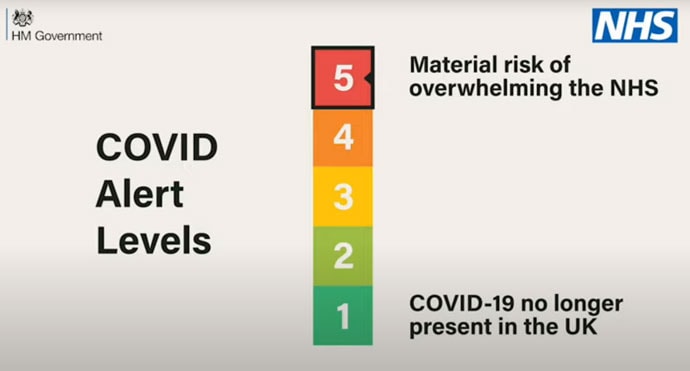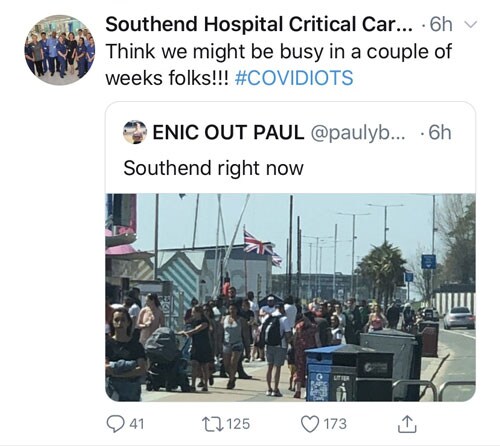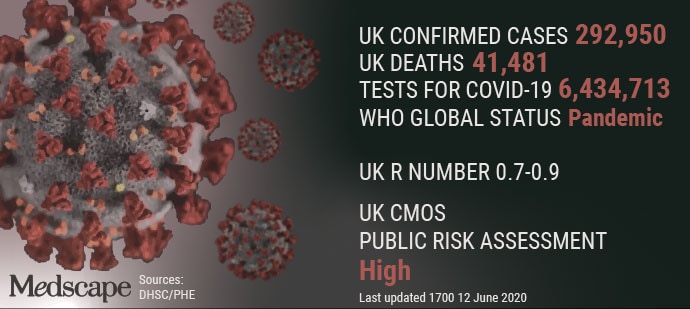These are the UK coronavirus stories you need to know about today.
New COVID-19 Alert Levels
Boris Johnson's TV address was widely previewed and came with few surprises or immediate lockdown changes.
People's "hardships" have been "the only way to defeat the coronavirus, the most vicious threat this country has faced in my lifetime," he said.
So when announcing conditional changes he said: "It would be madness now to throw away that achievement by allowing a second spike."
He promised a "first sketch of a roadmap for reopening society, a sense of the way ahead."
A COVID-19 alert system will signal stages of lockdown measures based on the R number.

"The lower the level, the fewer the measures, the higher the level, the tougher and stricter, we will have to be."
There'll be five alert levels, the PM said: "Level 1 means the disease is no longer present in the UK, and level 5 is the most critical, the kind of situation we could have had if the NHS had been overwhelmed.
"Over the period of the lockdown we've been in level 4, and it's thanks to your sacrifice, we're now in a position to begin to move, in steps, to level 3."
The first step announced was that anyone who can't work from home "should be actively encouraged to go to work," if it is safe to do so, Mr Johnson said. "We've been working to establish new guidance for employers to make workplaces COVID secure."
Exercise rules change from Wednesday: "We want to encourage people to take more, and even unlimited amounts, of outdoor exercise. You can sit in the sun in your local park, you can drive to other destinations. You can even play sports, only with members of your own household.
"You must obey the rules on social distancing and to enforce those rules, we will increase the fines for the small minority who break them."
On schools and shops, he said: "In the next few weeks and months, we may be able to go further. In step 2, at the earliest by June 1st after half term, we believe we may be in a position to begin the phased reopening of shops and to get primary pupils back into schools, in stages, beginning with reception, year 1, and year 6.
"Our ambition is that secondary pupils facing exams next year we'll get at least some time with their teachers before the holidays."
Step 3, "at the earliest by July, and subject to all these conditions and further scientific advice, if and only if, the numbers support it, we will hope to reopen at least some of the hospitality industry, and other public places, provided they're safe and enforce social distancing."
Mr Johnson stressed that everything he announced came with conditions "if we can't do it by those dates, and if the alert level won't allow it, we will simply wait and go on until we've got it right.
"We will come back from this devilish illness," he promised.
Prof Trish Greenhalgh, professor of primary care health sciences, Nuffield Department of Primary Care Health Sciences, University of Oxford, was among experts commenting via the Science Media Centre. "It looks like the PM is trying to implement the 'have cake and eat it' maxim." she said.
"On the one hand, he says he’s not lifting the lockdown because he is determined to avoid a second peak. On the other hand, he appears very keen to lift the lockdown because he urgently needs to fix the economy."
Mr Johnson's announcements will apply to England, while Scotland, Wales, and Northern Ireland will have developed their own plans.
New Slogan Criticised
'Stay home' is replaced with 'stay alert' in a new slogan.

Mr Johnson said he "consulted across the political spectrum, across all four nations of the UK".
However, Scotland's First Minister said the first she knew about the message change was when she read it in today's newspapers. She doesn't want the new message used in Scotland. "I do not know what 'Stay Alert' means," she said and that her message remained 'stay home'.
Wales' First Minister Mark Drakeford said: "Being alert is important, but staying at home has not gone away."
Northern Ireland's First Minister Arlene Foster also said she would not be dropping the "stay at home" message.
The slogan has also been criticised by experts.
Prof Simon Wessely, regius professor of psychiatry at King’s College London and director of the Health Protection Research Unit in Emergency Preparedness and Response, said: "It’s hard to be clear what that means, as opposed to 'stay inside'."
Prof Til Wykes, vice dean of the Institute of Psychiatry, Psychology and Neuroscience at King’s College London, said: "The one thing that helps the population is clear, concise and accurate messaging. This one is concise only. The previous message to stay home was at least clear. What does stay alert mean? It will just be confusing, be open to misinterpretation and likely to increase risky behaviour - that means taking risks that will affect everyone and increase infections."
There have been more reports of lockdown breaches since Thursday's headlines which included "Hurrah! Lockdown Freedom Beckons" (Daily Mail).
In response to images of people ignoring advice to visit the coast, Southend Hospital Critical Care Unit tweeted: "Think we might be busy in a couple of weeks folks!!! #COVIDIOTS"

'Tiger Eye' Goggles Recalled
Tiger Eye goggles from the 2009 Pandemic Influenza Preparedness Programme (PIPP) stock have been recalled after safety tests ordered by the Health and Safety Executive (HSE).
The Department of Health and Social Care's 'Dear Colleague' letter said: "The test has shown the product does not meet the current requirement for splash protection required in BSN 166 (including certain testing requirements documented in BSN 168). As a result, this product should not be used in a COVID-19 setting, and we are removing it from the supply chain."
NHS Confederation Chief Executive Niall Dickson commented: "Another serious PPE incident is not [what] we need right now, and yet again this is likely to hit the confidence of frontline staff in protective equipment.
"These stocks must now be identified and withdrawn. The Government insists there is no shortage of appropriate eye protection and we must hope that assurance is justified."
Also commenting, Director of Policy and Strategy at NHS Providers, Miriam Deakin, said: "The safety of staff treating and looking after patients is paramount. There can be no compromise on this, and the decision to remove the defective stock reflects that approach.
"Clearly it would have been better to have identified the problem with the stock before it was distributed.
"But the alert – sent out when the problem came to light - reflects a safety system in action.
"It’s vital now that any shortages resulting from this are dealt with quickly and effectively."
Daily Deaths and Data
There was no Downing Street briefing ahead of the PM's statement. Data was released online without the usual medical and scientific commentary.
Another 269 UK COVID-19 deaths were announced today taking the total to 31,855. Weekend numbers tend to be lower.
Of the 178 deaths in English hospitals, patients were aged between 32 and 98.
Of these 12 aged between 58 and 95 had no known underlying health condition.
Daily COVID-19 tests again stayed below the current 100,000 daily target at 92,837. The new target is 200,000 a day by the end of the month.
Another 3923 positive cases were reported.
On Thursday we heard from England's deputy CMO Jenny Harries there'd been a "technical hitch in the lab" affecting testing numbers. Today it emerged 50,000 samples had to be flown to the US for testing as a contingency to deal with what the Department of Health called "teething problems".
NHS Deaths
Among the recently announced NHS deaths was learning disabilities nurse Augustine Agyei-Mensah from Northamptonshire Healthcare NHS Foundation Trust. Chief Executive Angela Hillery paid tribute: "Augustine epitomised what we stand for here at NHFT. He was committed to making a difference and giving people a second chance.
"Augustine cared for some of the most vulnerable in our society; lives have been transformed because of him."
A letter to Boris Johnson demanding coroner's inquests for every NHS workers' death has been signed by more than 100,000 people. The campaign is coordinated by Doctors' Association UK. Its chair Dr Rinesh Parmar said in a news release: "It is vitally important these challenges are seen as an opportunity to learn. We need to ensure no healthcare worker is put in harm’s way in this manner again and the families get answers."





